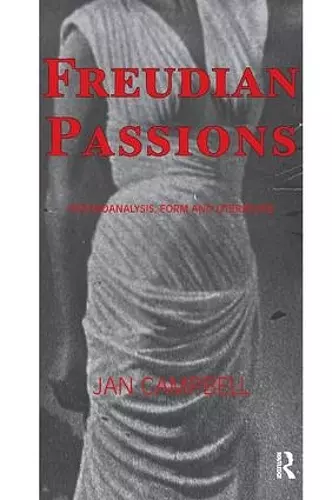Freudian Passions
Psychoanalysis, Form and Literature
Format:Paperback
Publisher:Taylor & Francis Ltd
Published:1st Jun '13
Currently unavailable, and unfortunately no date known when it will be back
This paperback is available in another edition too:
- Hardback£135.00(9780367106126)

Freud's thinking about the unconscious has always been seen to be more about representations than affects. When it came to the passions of the transference and the demands of his hysterical patients, Freud was always more interested, wanted to move the focus away from the transference, and onto dreams. Hidden wishes more than manifest ones were what captured his imagination and style.This book returns to the repressed theory of passions in Freud's own thinking, arguing that the repression, fixation and rhythmic movement of affects make up the roots and branches of psychoanalytic thinking. We can think of Freud's unconscious affects as a tree, with the most passionate and primitive affects that make up the core of our psychic life, moving and branching out into more elaborated emotions and representations. So what moves this tree: the house of our first passions? How we move the tree of our affects, or leave it, is integral to Freud's understanding of sexuality and the Oedipal Complex. Sexuality is the life force of our affects, the flows and the forms that connect us to other people, elaborating our egos. Contrary to many current theories of affect within sociology or psychology, psychoanalysis makes us understand that there is no such thing as affects without form. Or if there were such passions, we could know nothing about them. This is where this books starts, with the premise that affects are always in search of forms, but so often our affects are a return to earlier forms, to the first ones that dressed our passions.
'In Freudian Passions, a genuinely original piece of contemporary psychoanalytic writing, Campbell, as a clinician and writer herself, gives us, in William James's words, "something to be going on from", something that is all too rare in psychoanalytic writing. No-one has been able to mix personal reminiscence, psychoanalytic theory and practice, and readings of literary texts, in quite this way.' - From the Preface, by Adam Phillips'Psychoanalytic theory since Lacan has centred on the dynamics of desire and castration, as governed by the law of the father. Challenging this Lacanian orthodoxy, Jan Campbell shifts our attention to the passions, which connote passivity and receptivity in contrast to the active force associated with desire. "We suffer our passions," which can overwhelm us unless they are contained within a form. It is our pre-Oedipal intimacy with the mother, Campbell claims, that provides a "genre" with which to articulate the passions, a genre rooted in the rhythms and gestures of the body, prior to language and the symbolic order. Like a literary genre, the mother shapes her child's passions into communicable form without impeding their experimental energy. Campbell, who is both a literary scholar and a psychoanalyst, argues that mother and child "read" each other in a dialectic of immersion and separation that revives in the experience of reading literary works. In her inventive interpretations of George Eliot and Virginia Woolf, together with her skilful navigation of psychoanalytic theory, Campbell demonstrates how forms of literature hark back to those preverbal forms in which the nascent self learns how to hold its passions.'- Maud Ellmann, Berlin Professor of English, University of Chicago 'In Freudian Passions, Jan Campbell offers less a psychoanalytic theory of reading than the far more original, risky and adventurous project of reconceiving psychoanalysis as reading. In prose at once lyrical and precise, exuberant and controlled, Campbell not only describes but performs a practice of reading premised not on interpretive mastery, but on the telepathic relay between the excessive passions of the infant and the form-giving receptivity of the mother. What emerges is a seamless and exhilarating weave of the clinical and the theoretical, the literary and the personal. To those who insist psychoanalysis can't approach literature without reducing or trivializing it, this singular and fascinating book offers a timely riposte.' - Josh Cohen, Psychoanalyst (British Psychoanalytical Society) and Professor of Modern Literary Theory, Goldsmiths University of London
ISBN: 9781855756168
Dimensions: unknown
Weight: unknown
276 pages